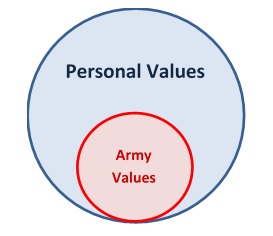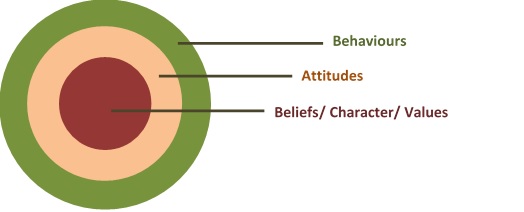Introduction
I wonder what kind of answers we will get if we randomly select a group of soldiers and ask them this question: 'What are your top 10 personal values?'
How confident will we be that their personal values will also include our Army values: Courage, Initiative, Respect and Service or values within ‘Our Contract with Australia’?
If we expect our soldiers to display the Army values at all times, ‘I am an Australian Soldier – always’ (i.e. at work and after hours), then surely, we must assume and expect that the Army values are integrated and nested within their personal values rather than compartmentalised to work hours.

Our beliefs, character and values are 'powerful determinates of individual attitudes and behaviours… [they] are strong forces to shape behaviours.' (Land Warfare Doctrine 0-2 Leadership, Section 2-2, para 2.5). In essence, our beliefs and values shape and determine our attitudes and govern the way we behave.
What is the consequence of a soldier displaying behaviours that deviate from our Army values?
We apply behavioural modification techniques such as records of conversation, counselling, expectation management, re-training, infringement or Defence Force Discipline Act (DFDA) action in order to realign their behaviours. Our aim is sustainable behaviour transformation where a soldier's personal views are aligned with the Army values.
So how can we prevent this negative action and instil Army's values in our soldiers?
One strategy is to focus on character development throughout the soldier’s career. ‘The demands of military service require the Army to develop an individual’s character as the foundation for moral and ethical behaviours which is consistent with Army values’ (Army Training Instruction (ATI) 5-1/2017 Military Character Development, para 11).
The first step of helping soldiers to understand values and to comply with expected behaviours is 'building self-awareness' (ATI 5-1/2017 Military Character Development, para 19).
This article hopes to provide three simple ways to help junior leaders to facilitate honest and frank discussions with soldiers about their personal values and building self-awareness of their belief and value systems by examining their behaviours.
Identifying your soldiers' personal values (Let them ‘Talk the Talk’)
- Ask your soldiers to write a list of their personal values.
- Do their values include the Army values or values nested within ‘Our Contract with Australia’? Ask them to explain why this is, or is not, the case.
Evaluating personal values by examining the consistency of one’s behaviour (Do they ‘Walk the Walk’?)
Have honest discussions with soldiers about whether they actually display their values (including Army values) outside of work hours in their day to day lives.
Interestingly, we can tell a lot about a soldier’s values by examining behaviours, e.g. by examining a snapshot of how they spend their time and money. It is difficult for a person to say that they value compassion when they have not shown compassion through the use of their time or finances. It is easy to ‘talk the talk’ but much harder to live out a sustained ‘walk the walk’.
Ask them to reflect on the last seven days (outside of work hours) and pose these questions:
If your behaviours are a reflection of your values, what activities have you engaged in outside of work hours that demonstrate an integration of the Army values and the values within ‘Our Contract with Australia’ into your personal values?
- Example A: Craftsman Jones regularly gives blood and plasma in his local Australian Red Cross Blood Bank even though he hates needles. He demonstrates values of courage, compassion, initiative and respect.
- Example B: Private Smith plays in the local soccer team on Saturdays and trains for one hour on a weeknight. This soldier is spending time to enhance the Army value of ‘teamwork’.
- Example C: Sapper Martin volunteers to mow his colleague’s lawn while his colleague is injured. He demonstrates values of mateship, loyalty, teamwork, initiative and compassion.
How have you used your finances to reflect an integration of the Army values and the values within ‘Our Contract with Australia’ into your personal values?
- Example A: Trooper Stone donates a portion of his finances to sponsor a child and a humanitarian project through a charity organisation because he believes in the dignity of all people and wants to make a small contribution towards a sustainable change for the better. He displays values of courage, compassion and respect.
- Example B: Private James buys an extra bag of various tinned foods once a month and donates it to the local church/ temple/ mosque/ food bank to support under privileged people in the community. He displays values of compassion, leading by example, initiative and respect.
- Example C: Sapper Hogan was walking in the shops on the weekend when he walked towards a children’s charity stall. He had a five dollar note in his pocket. He was going to buy himself a drink but decides to take the opportunity to donate it. His actions displayed courage, initiative, compassion and respect.

Help our soldiers to practically apply the Army values in their day-to-day lives
Our junior leaders must lead by example. If we expect our Other Ranks (ORs) to display the Army values in their behaviours at all times, then as leaders we must set the standards ourselves during and outside of work hours. We also need to take the initiative and have the moral courage to mentor our ORs to help align their personal values to the Army values. It is worth investing in our future leaders knowing that Army's most valuable capability is its people.
It is important to keep in mind that the practical strategies that you are thinking of implementing in order to facilitate a behaviour transformation should be sustainable, so perhaps start with something small.
- Example A: Private Cole is willing to volunteer two hours a month. This time could be spent visiting a socially isolated veteran to provide friendship and re-connection with the local community through a charity organisation or the local Returned and Services League.
- Example B: The section agrees to help out practically with any soldier in the Platoon if they are injured or away on course, like mowing the lawn, checking the mail box, gardening or looking after the pets, etc.
Conclusion
Service in the Australian Army is not just a job but a lifestyle. The Australian public holds us in high esteem; it is our duty and privilege to behave in ways that reflect and exemplify the Army values and ‘Our Contract with Australia’ in all aspects of our lives.










I’ve often heard it said that Gallipoli was a forge, or a melting pot where soldiers character was made. And while in some respects it did melt them together, the character grit and determination they showed was probably well established in them before they even enlisted.
The hardships and trials they endured developed that character exponentially, but it grows from seed that was nurtured before the storms.
Well presented article Padré